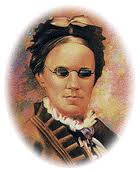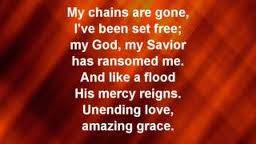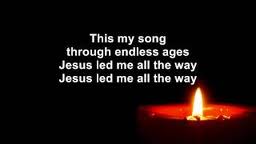Notes on the Notes – March 17, 2013
Today’s Readings – Isaiah 43:16-21, Philippians 3:4-14
This week’s music:
God You Meet Us – This hymn is from “the green book, ” Songs for a Gospel People. The words were written by Glen Baker in 1976. We will be using the tune HOLY MANNA (VU #460) which was composed by William Moore in 1825.
 Psalm 121 – Today the Joyful Noise will be singing a setting of Psalm 121. This psalm was written anonymously, but no doubt during or after the Babylonian Exile (prior to 430 BC). What led to this psalm and specifically what caused the psalmist to look to the mountains is not known, but the implication of his looking for help is that he may have been in a state of anxiety or distress. It is often referred to as the Soldier’s Psalm or the Traveler’s Psalm. The overall theme of the Psalm is that
Psalm 121 – Today the Joyful Noise will be singing a setting of Psalm 121. This psalm was written anonymously, but no doubt during or after the Babylonian Exile (prior to 430 BC). What led to this psalm and specifically what caused the psalmist to look to the mountains is not known, but the implication of his looking for help is that he may have been in a state of anxiety or distress. It is often referred to as the Soldier’s Psalm or the Traveler’s Psalm. The overall theme of the Psalm is that
7 The Lord will keep you from all harm— he will watch over your life; 8 the Lord will watch over your coming and going both now and forevermore.
 There’s a Wideness in God’s Mercy (VU 271) – This hymn is based on a poem by F.W. Faber, a 19th-century Anglican priest who converted to Roman Catholicism (1854). The author of this hymn, Frederick William Faber, was raised as a Huguenot, but went to Oxford and was ordained as an Anglican priest in 1837. He then came to know John Henry Newman, the famous Catholic priest (and later Cardinal). Under Newman’s influence, Faber was re-baptized and re-ordained as a Catholic priest. Faber was an admirer of good poetry, and became good friends with the poet, William Wordsworth. The two of them would often take long walks together in the mountains. Knowing the power of hymns in the Protestant tradition, Faber wanted to make hymn-singing more important in the Catholic tradition. He wrote a number of hymns, of which this and “Faith of Our Fathers” are the best known today.
There’s a Wideness in God’s Mercy (VU 271) – This hymn is based on a poem by F.W. Faber, a 19th-century Anglican priest who converted to Roman Catholicism (1854). The author of this hymn, Frederick William Faber, was raised as a Huguenot, but went to Oxford and was ordained as an Anglican priest in 1837. He then came to know John Henry Newman, the famous Catholic priest (and later Cardinal). Under Newman’s influence, Faber was re-baptized and re-ordained as a Catholic priest. Faber was an admirer of good poetry, and became good friends with the poet, William Wordsworth. The two of them would often take long walks together in the mountains. Knowing the power of hymns in the Protestant tradition, Faber wanted to make hymn-singing more important in the Catholic tradition. He wrote a number of hymns, of which this and “Faith of Our Fathers” are the best known today.
“There’s a Wideness in God’s Mercy” celebrates the wideness of God’s mercy –– “like the wideness of the sea.” It celebrates God’s welcome for the sinner and the “good” person alike. It reminds us that “the love of God is broader than the measure of our mind” –– and therefore encourages us to broaden the measure of our own love so that it might be more like God’s love. And, finally, it calls us to “rest upon God’s word” so that “our lives (might be) illumined by the presence of our Lord.” Source: Richard Niell Donovan (Lectionary.org).
Amazing Grace (My Chains are Gone) – Today’s anthem “Amazing Grace (My Chains are Gone)” is a choral setting by Joel Raney of Chris Tomlin’s Praise and Worship Song from 2006. The original “Amazing Grace” was written by the English poet and clergyman John Newton (1725-1807), published in 1779. Containing a message that forgiveness and redemption are possible regardless of sins committed and that the soul can be delivered from despair through the mercy of God, “Amazing Grace” is one of the most recognizable songs in the English-speaking world.
Newton wrote the words from personal experience. He grew up without any particular religious conviction, but his life’s path was formed by a variety of twists and coincidences that were often put into motion by his recalcitrant insubordination. He was pressed (forced into service involuntarily) into the Royal Navy, and after leaving the service became involved in the Atlantic slave trade. In 1748, a violent storm battered his vessel so severely that he called out to God for mercy, a moment that marked his spiritual conversion. However, he continued his slave trading career until 1754 or 1755, when he ended his seafaring altogether and began studying Christian theology.
Ordained in the Church of England in 1764, Newton began to write hymns with poet William Cowper. “Amazing Grace” was written to illustrate a sermon on New Year’s Day of 1773. It is unknown if there was any music accompanying the verses; it may have simply been chanted by the congregation. It debuted in print in 1779 in Newton and Cowper’s Olney Hymns, but settled into relative obscurity in England. In the United States however, “Amazing Grace” was used extensively during the Second Great Awakening in the early 19th century. It has been associated with more than 20 melodies, but in 1835 it was joined to a tune named “New Britain” to which it is most frequently sung today.
“Amazing Grace” is “without a doubt the most famous of all the folk hymns,” and it is estimated that it is sung 10 million times a year.
Hear Christian song-writer Chris Tomlin talk about the inspiration behind his addition to the traditional hymn Amazing Grace. http://www.theheartofworship.org/stories.shtml (then Click on Amazing Grace)
All the Way My Saviour Leads Me (VU 635) – “All The Way My Savior Leads Me” was written by one of the most prolific songwriters in history. Fanny Crosby wrote over 8,000 Christian hymns despite the handicap she struggled with during her life. An inept doctor left Fanny without her eyesight at six weeks of age after a botched procedure. She said, “ If perfect earthly sight were offered me tomorrow I would not accept it. I might not have sung hymns to the praise of God if I had been distracted by the beautiful and interesting things about me.” “All The Way My Savior Leads Me” is one of her songwriting masterpieces.
 Fanny Crosby worte this hymn on a day when an unexpected kindness had come her way. This beloved hymn came to Fanny as a result of a prayer. Struggling financially, she desperately needed some money. As her usual custom, Fanny began to pray. A few minutes later, a gentleman offered her five dollars, the exact amount she needed. Later recalling the incident, she said, “I have no way of accounting for this except to believe that God put it into the heart of this good man to bring the money.” The poem she wrote afterward became “All The Way My Savior Leads Me.” She sent the text to Robert Lowrey who composed the tune for it. It was first published in Chicago, in Brightest and Best (1875), a tune book for Sunday schools.
Fanny Crosby worte this hymn on a day when an unexpected kindness had come her way. This beloved hymn came to Fanny as a result of a prayer. Struggling financially, she desperately needed some money. As her usual custom, Fanny began to pray. A few minutes later, a gentleman offered her five dollars, the exact amount she needed. Later recalling the incident, she said, “I have no way of accounting for this except to believe that God put it into the heart of this good man to bring the money.” The poem she wrote afterward became “All The Way My Savior Leads Me.” She sent the text to Robert Lowrey who composed the tune for it. It was first published in Chicago, in Brightest and Best (1875), a tune book for Sunday schools.
Categories: Music Programs, Sunday Bulletin and Announcements, Worship





You must be logged in to post a comment.